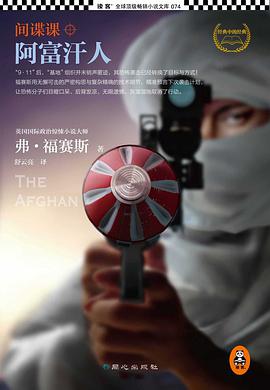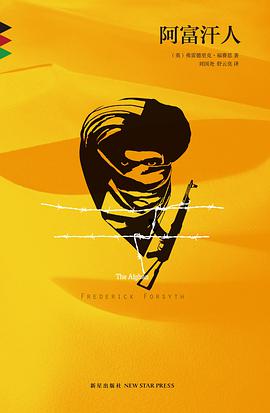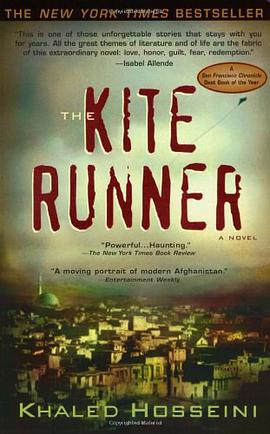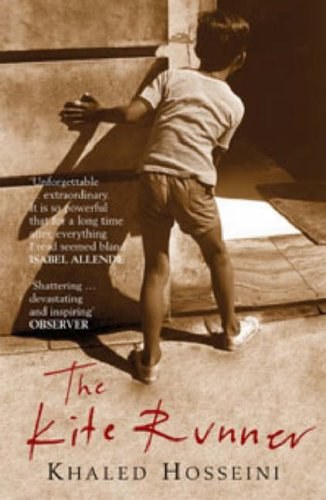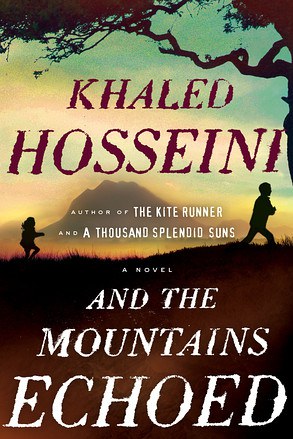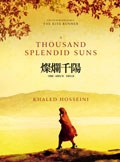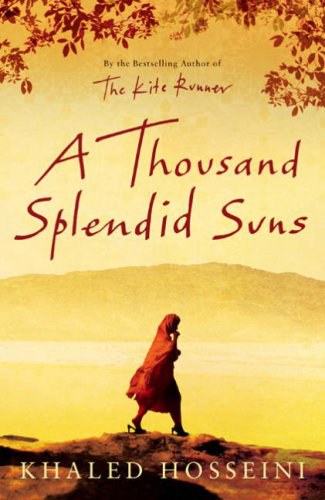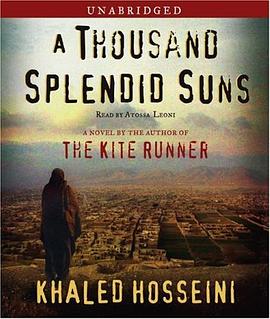An unforgettable novel about finding a lost piece of yourself in someone else.
Khaled Hosseini, the #1 New York Timesbestselling author of The Kite Runner and A Thousand Splendid Suns, has written a new novel about how we love, how we take care of one another, and how the choices we make resonate through generations. In this tale revolving around not just parents and children but brothers and sisters, cousins and caretakers, Hosseini explores the many ways in which families nurture, wound, betray, honor, and sacrifice for one another; and how often we are surprised by the actions of those closest to us, at the times that matter most. Following its characters and the ramifications of their lives and choices and loves around the globe—from Kabul to Paris to San Francisco to the Greek island of Tinos—the story expands gradually outward, becoming more emotionally complex and powerful with each turning page.
Editorial Reviews
From Barnes & Noble
After his triumphant novels The Kite Runner and A Thousand Splendid Suns, Khaled Hosseini gifts us with a poignant story of love, loss, and recovery across several families and over several generations. Like an intricately woven tapestry, And the Mountains Echoed pulls us into the lives of disparate children, men, and women in Afghanistan, France, Greece, and California, showing us how the choices they and other make resonate over decades. A masterpiece; superlative early reviews.
The New York Times - Michiko Kakutani
…his most assured and emotionally gripping story yet, more fluent and ambitious than The Kite Runner, more narratively complex than A Thousand Splendid Suns…Mr. Hosseini's narrative gifts have deepened over the years, enabling him to anchor firmly the more maudlin aspects of his tale in genuine emotion and fine-grained details. And so we finish this novel with an intimate understanding of who his characters are and how they've defined themselves over the years through the choices they have made between duty and freedom, familial responsibilities and independence, loyalty to home and exile abroad.
The Washington Post - Marcela Valdes
Nuance is rare on the bestseller list. In most cases, ambiguity is stripped away to appeal to the greatest number and lowest common denominator. So it always renews my faith when a popular novelist shows a decided preference for moral complexity. It suggests that readers crave more than simplistic escape. Or perhaps it just means that some writers, like Khaled Hosseini, know how to whisk rough moral fiber into something exquisite…Over and over again, he takes complicated characters and roasts them slowly, forcing us to revise our judgments about them and to recognize the good in the bad and vice versa.
Publishers Weekly
Hosseini’s third novel (after A Thousand Splendid Suns) follows a close-knit but oft-separated Afghan family through love, wars, and losses more painful than death. The story opens in 1952 in the village of Shadbagh, outside of Kabul, as a laborer, Kaboor, relates a haunting parable of triumph and loss to his son, Abdullah. The novel’s core, however, is the sale for adoption of the Kaboor’s three-year-old daughter, Pari, to the wealthy poet Nila Wahdati and her husband, Suleiman, by Pari’s step-uncle Nabi. The split is particularly difficult for Abdullah, who took care of his sister after their mother’s death. Once Suleiman has a stroke, Nila leaves him to Nabi’s care and takes Pari to live in Paris. Much later, during the U.S. occupation, the dying Nabi makes Markos, a Greek plastic surgeon now renting the Wahdati house, promise to find Pari and give her a letter containing the truth. The beautiful writing, full of universal truths of loss and identity, makes each section a jewel, even if the bigger picture, which eventually expands to include Pari’s life in France, sometimes feels disjointed. Still, Hosseini’s eye for detail and emotional geography makes this a haunting read. Agent: Robert Barnett, Williams & Connolly. (May)
Daily Beast
Wrought with mastery, And the Mountains Echoed is not just a well spun tale, but an accomplishment of the most elusive of literary challenges—the humanization of a war ravaged population in the eyes of the very people complicit in their ruin.
San Francisco Chronicle
There is an assured, charismatic new maturity to Hosseini's voice. When he hits his stride, the results are electrifying.
Boston Globe
Hosseini delves into the joys, sorrows, and betrayals that alternately bind and fracture families. Once again, Hosseini's lovingly rendered Afghanistan takes center stage, but in this book he extends his examination to encompass how the Afghan identity affects his characters' decisions and lives in unfamiliar environments.
Los Angles Times
[Hosseini's] beautifully written, masterfully crafted new book, And the Mountains Echoed, spans nearly 60 years of Afghan history as it investigates the consequences of a desperate act that scars two young lives and resonates through many others. . . . And the Mountains Echoed is painfully sad but also radiant with love.
The Miami Herald
Compulsively readable, in large part because [Hosseini] probes his characters' psyches in a nuanced and poetic manner . . . And the Mountains Echoed attains a greater level of complexity than its two predecessors . . . and signals the ongoing maturation of a gifted storyteller.
Austin Chronicle
Readers' tears may fall by first chapter's end. Introspective and perfectly paced, Hosseini's microcosmic plot spares no expense with sensory details...Hosseini skillfully weaves the tapestry with universal elements: human fallibility, innate goodness, perseverance, forgiveness, sexuality, jealousy, companionship, and joy.... And the Mountains Echoed resonates to the core.
Kirkus Reviews
After two stellar novels set (mostly) in Kabul, Afghanistan, Hosseini's third tacks among Afghanistan, California, France and Greece to explore the effect of the Afghan diaspora on identity. It begins powerfully in 1952. Saboor is a dirt-poor day laborer in a village two days walk from Kabul. His first wife died giving birth to their daughter Pari, who's now 4 and has been raised lovingly by her brother, 10-year-old Abdullah; two peas in a pod, but "leftovers" in the eyes of Parwana, Saboor's second wife. Saboor's brother-in-law Nabi is a cook/chauffeur for a wealthy, childless couple in Kabul; he helps arrange the sale of Pari to the couple, breaking Abdullah's heart. The drama does nothing to prepare us for the coming leaps in time and place. Nabi's own story comes next in a posthumous tell-all letter (creaky device) to Markos, the Greek plastic surgeon who occupies the Kabul house from 2002 onwards. Nabi confesses his guilt in facilitating the sale of Pari and describes the adoptive couple: his boss Suleiman, a gay man secretly in love with him, and his wife, Nila, a half-French poet who high-tails it to France with Pari after Suleiman has a stroke. There follow the stories of mother and daughter in Paris, Markos' childhood in Greece (an irrelevance), the return to Kabul of expat cousins from California and the Afghan warlord who stole the old village. Missing is the viselike tension of the earlier novels. It's true that betrayal is a constant theme, as it was in The Kite Runner, but it doesn't work as a glue. And identity? Hosseini struggles to convince us that Pari becomes a well-integrated Frenchwoman. The stories spill from Hosseini's bountiful imagination, but they compete against each other, denying the novel a catalyst; the result is a bloated, unwieldy work.
Library Journal
This bittersweet family saga spans six decades and transports readers from Afghanistan to France, Greece, and the United States. Hosseini (The Kite Runner; A Thousand Splendid Suns) weaves a gorgeous tapestry of disparate characters joined by threads of blood and fate. Siblings Pari and Abdullah are cruelly separated at childhood. A disfigured young woman, Thalia is abandoned by her mother and learns to love herself under the tutelage of a surrogate. Markos, a doctor who travels the world healing strangers, avoids his sick mother back home. A feminist poet, Nila Wahdatire, reinvents herself through an artful magazine interview, and Nabi, who is burdened by a past deed, leaves a letter of explanation. Each character tells his or her version of the same story of selfishness and selflessness, acceptance and forgiveness, but most important, of love in all its complex iterations. VERDICT In this uplifting and deeply satisfying book, Hosseini displays an optimism not so obvious in his previous works. Readers will be clamoring for it. [See Prepub Alert, 11/04/12.]—Sally Bissell, Lee Cty. Lib. Syst., Estero, FL
The Barnes & Noble Review
Each of Khaled Hosseini's three novels — The Kite Runner, A Thousand Splendid Suns, and now And the Mountains Echoed — begins with a betrayal and then gradually finds its way toward an unexpected redemption. Each includes within its cast of characters at least one orphaned or abandoned child. In all three books, the author exhibits an unabashed didacticism, using plainspoken family dramas to convey the complex recent history and culture of Afghanistan to multitudes of readers in America and around the world. (To date, more than 10 million copies of Hosseini's books have been sold in the U.S. alone.) Yet in each of the books the author's allegiance is above all to the story, from which he has stripped away most stylistic enhancements, reducing his tale to its emotional essence. To Hosseini's detractors, his narrative purity comes off as trite earnestness. To his legions of fans it's a virtue, a hallmark of credibility and consistency.
For all these similarities among Hosseini's novels, it's their differences that are more interesting and instructive. By paying attention to those differences, which are chiefly structural, one can follow the evolution of Hosseini's refinement as a storyteller. The Kite Runner traced a more or less straightforward line from the narrator's childhood in 1960s–'70s Kabul to his adult life in Northern California around the turn of the millennium. In A Thousand Splendid Suns, instead of telling a single story from a single point of view, Hosseini abruptly switched characters partway through the novel and started again, ultimately weaving both halves of the narrative together. It was a risk, but it worked: the fracturing of the story mirrored the fracturing of Afghanistan's social structure during three decades of violent instability, from the Soviet invasion beginning in December 1979 through a prolonged civil war, the rise of the Taliban, and American military involvement after September 11, 2001.
Hosseini's third book is even more structurally sophisticated. "You want a story and I will tell you one," it begins, but in fact And the Mountains Echoed contains many stories, starting over not just once but many times, as it ranges capriciously through varying points of view and time periods and far-flung locations.
Once again Hosseini begins, classically, with a simple family tale. In 1952, in a remote Afghan village called Shadbagh, a penniless day laborer is compelled to sell his three-year-old daughter to a wealthy childless couple in Kabul in order to sustain his wife and remaining children. The little daughter, named Pari, has a deep mutual bond with her ten-year-old brother, Abdullah, who until now has been her main caregiver. The grief and guilt that this forced separation inflicts on all the family members will flare up periodically throughout their lives. It will spread over continents, too, since Pari will eventually spend most of her life in France, and Abdullah will emigrate to America as an adult, in 1982.
Hosseini's intention is to show how stubbornly a homeland manages to cling to a person, in strange and diluted ways, even after years of dispersion and assimilation. Thus we note that Pari, who has lived in Paris since her adoptive mother moved her there from Kabul when she was six, has twinges of recovered memory of Shadbagh and her unmentioned birth family, "like a message sent across shadowy byways and vast distances, a weak signal on a radio dial, remote, warbled." And we see Abdullah, transplanted to the San Francisco Bay Area, educating his American daughter with lessons in Farsi and the Koran and slaving away in his restaurant, Abe's Kabob House, with its tourist-friendly menu of "Caravan Kabob, Khyber Pass Pilaf, Silk Route Chicken," and - - notes his sharp-eyed daughter — "the badly framed poster of the Afghan girl from National Geographic, the one with the eyes — like they had passed an ordinance that every single Afghan restaurant had to have her eyes staring back from the wall."
It's not only these central characters who feel the presence of their origins as if they were gingerly touching an old wound. There is Idris Bashiri, Abdullah's Bay Area doctor, who wrestles with his guilt as a privileged Westernized Afghan when he travels to his hometown of Kabul and sees the suffering of a population ravaged by ongoing privation and war. There is Markos Varvaris, a plastic surgeon and relief worker in Kabul who grew up on the Greek island of Tinos, attempting to bury the pain of his difficult childhood by aiding the disadvantaged in hotspots around the world. And there is Gholam, a thirteen-year-old Afghan boy made cynical by years of displacement in a refugee camp in Pakistan, who returns to his village with his family to find that their land has been stolen by a drug warlord.
These are all separate stories, yet Hosseini takes care to connect each of them, in roundabout ways, to the central narrative of Pari and Abdullah's ruptured family. By tracing the paths of many characters from their birthplaces to various diasporas, he has expanded his familiar themes of betrayal and redemption into a narrative edifice that is much grander than the plainer architecture of The Kite Runner and A Thousand Splendid Suns. And he has accomplished this without losing the homespun emotional forcefulness that distinguished those earlier novels. An author with a less urgent calling might be willing merely to manage the brand of his or her success, recycling the same magic formulas that initially captivated audiences. Not so for Hosseini, a popular-fiction writer of the highest caliber whose talent is as agile and wide-ranging as his new novel itself.
Donna Rifkind's reviews appear frequently in The Washington Post Book World and the Los Angeles Times. She has also been a contributor to The New York Times Book Review, The Wall Street Journal, The Times Literary Supplement, The American Scholar, and other publications. In 2006, she was a finalist for the Nona Balakian Citation for Excellence in Reviewing from the National Book Critics Circle.
Reviewer: Donna Rifkind
